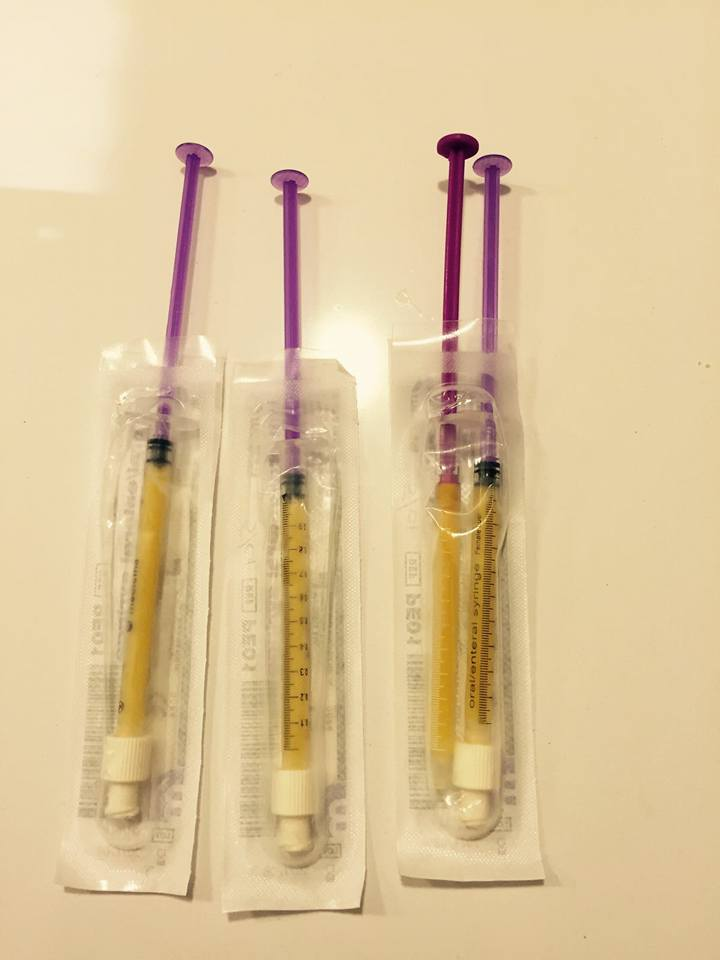Holistic Babies London
When science meets holistic therapies
15. Jan, 2021
Breastfeeding: Colostrum Harvesting in Pregnancy
This is part 1 of Colostrum Harvesting article.
WHAT IS COLOSTRUM HARVESTING?
Colostrum harvesting is the collection of colostrum, the "first milk" secreted by a pregnant woman from about 16 weeks of pregnancy. Collected from around 34 to 35 weeks pregnancy by hand expressing and it is stored into single-use syringes, frozen and saved until the baby is born.
WHY SHOULD I TRY AND HARVEST COLOSTRUM?
In an ideal world, a baby would have a non-traumatic vaginal birth, lots of uninterrupted skin to skin with mum, naturally reaching the breast within the "golden hour" and feeding without assistance. Some babies do that, and that is wonderful! Unfortunately for mums & babies, it is not always the case. Some babies will not feed straight away for a multitude of reasons (listed below).
THE GOLDEN HOUR:
In the event of a baby not feeding within the "golden hour" (the couple of hours post-birth), we often end up with a sleepy baby who is just "not interested".
It is usual for a baby to be very sleepy after the initial "golden hour". During and after the birth, cortisol levels in the baby are high, keeping her awake and creating an ideal mindset for her to feed. However, once the cortisol levels drop, she will feel tired and sleepy, a well-deserved rest after such hard work!
If she is not feeding at the breast, it is crucial to offer colostrum as often as possible to prevent too much weight loss (5 to 7 MLS of colostrum each time). We would expect a healthy term baby to feed between 8 and 12 times a day as the milk comes in and keep cluster feeding to bring on the milk by day 3. Over the first 24 to 48h, those feeds may happen hourly, there may be cluster feeding, and the feeds may vary in length (from a few minutes to 1h!).
However, what if the baby has missed this golden hour to feed? What if a mother is unwell and cannot feed her baby? What if the baby is unwell or sore to feed at the breast? In most cases, after that initial 24h to 48h, if there is no colostrum available, formula will be offered (even though donor milk should be the first choice!).
Colostrum is a superfood for babies! It is tailored to babies' needs and secreted in perfect amounts for the baby's immature liver and kidneys to process.
Your baby may need to feed hourly between day 0 and the milk coming in around day 3. It is designed to establish the milk supply. It is the best food for ALL babies: premature, low birth weight, sick, healthy, average birth weight, babies at risk of hypoglycaemia (maternal diabetes, PCOS, corticosteroid treatments to name a few). No matter how elaborate a brand of formula may be, it will never come close enough to colostrum and breast milk in general.
WHO SHOULD HARVEST COLOSTRUM?
Pregnancy & birth are significant determinants of how well a baby will feed.
EVERYONE! (Unless you were told that you should not breastfeed for medical reasons). Even if a woman has a low-risk pregnancy, birth is unpredictable. This is why harvesting is so important. No matter how qualified and smart a birth professional is, no one can predict when and how a baby will be born (Unless it is an elective caesarean section yet babies can decide to come earlier!).
- Endocrinal issues: diabetes, PCOS, pituitary gland issues, IVF (due to maternal infertility) to name a few. These women may see a delay in milk production or minimal amount secreted in the early days postpartum.
- High-risk mothers: most women CAN breastfeed, only about 1% of the female population cannot, that leaves 99% of women who should be able to yet cannot or give up early on (or at least before the 6 months of exclusive breastfeeding is up).
- Medication: Some medication may reduce milk supply; this is often the case of hypotensive meds given for raised blood pressure.
- Elective caesarean section: The body, having not been through labour, maybe a little behind with milk production. By the end of day 2, the baby will want to stimulate the breast as much as possible to bring on the milk, but often, the milk does not come until day 4 and mum ends up with a screaming baby whose demand is hard to meet.
- Fear of failing/ of not being able to breastfeed/ stress: we cannot under-estimate the power of the stress hormone cortisol on the body.
We know stress slows or stops labour, and it affects breastfeeding: a nervous mum will pass her stress to her new baby who will fuss and stress in return. The baby will find feeding challenging.
(continued on part 2)
Stephanie is an International Broad Certified Consultant in training. She has completed her 90 hours required breastfeeding theory. She has been supporting breastfeeding women for the past 12 years both in the NHS and the community.
To book an antenatal breastfeeding workshop/ colostrum harvesting session, please contact admin@holisticbabies.co.uk
